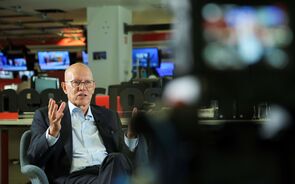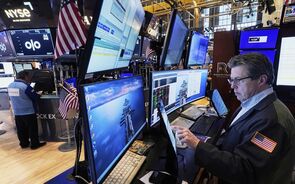September comes in like a bear
1 Mensagem
|Página 1 de 1
September comes in like a bear
Wall Street stages a sharp retreat as investors worry the recent market gains have outpaced the recovery. Dow down by triple digits; S&P 500, Nasdaq sink almost 2%.
Last Updated: September 1, 2009: 2:23 PM ET
NEW YORK (CNNMoney.com) -- Markets broadly sold off Tuesday afternoon, as investors took a big step back at the start of what is typically a rough month, betting that stocks have risen too far too fast without any underlying support.
"I think we've had a nice run and it's time for a bit of a pullback," said Tom Schrader, managing director at Stifel Nicolaus.. "I wouldn't be surprised if we moved back to the 880 level (on the S&P 500) before moving back up."
A drop to the 880 level would constitute a slide of about 12% from the current levels.
Investors nitpicked through the morning's better-than-expected reports on housing and manufacturing but found little reason to jump back into the fray.
With under 2 hours left in Tuesday's session , the Dow Jones industrial average (INDU) lost 152 points, or 1.6%. The S&P 500 (SPX) index fell 17 points, or 1.7%. The Nasdaq composite (COMP) fell 34 points, or 1.7%.
"I think the 'whisper number' for [the manufacturing report] was higher and once people digested that, the market swung in the other direction," said Schrader.
Schrader said that investors were also reacting to the "calendar influence," amid a variety of reports about the tendency for September to be a weak month on Wall Street.
"The reports this morning were positive, but investors are basically saying that stocks have had a good run up and now it's time to take some profits," chimed in Phil Orlando, chief equity market strategist at Federated Investors.
Stocks have essentially been on the rise since March, as investors have welcomed extraordinary fiscal and monetary stimulus and signs that corporate profits and the economy have stabilized. The major gauges ended last week at the highest levels in 9 to 10 months.
But with the S&P up 52% off the March 9 lows, market participants are now looking for concrete evidence that the economy is recovering. The morning's reports were positive, but perhaps not as positive as the most optimistic forecasts.
Manufacturing: The Institute for Supply Management's manufacturing index for August showed growth in the sector for the first time since January 2008. The index rose to 52.9 from 48.9 previously. Economists surveyed by Briefing.com thought it would rise to 50.5.
Pending home sales rose for the sixth straight month, jumping 3.2% in July, to the highest point in nearly two years, according to a report from the National Association of Realtors released Tuesday morning. The index rose 3.6% in June. Economists surveyed by Briefing.com thought sales would rise 1.5% in July.
Construction spending fell 0.2% in July versus forecasts for an unchanged reading. Spending rose a revised 0.1% in June.
Auto sales: The government's popular Cash for Clunkers program gave a boost to sales in August, major automakers said. Although a plunge in sales in the last week of the month, following the program's end, suggests the impact will not be far reaching.
Company news: Online auctioneer eBay (EBAY, Fortune 500) said it will sell a 65% stake in its Skype Internet phone business to a group of investors for $1.9 billion. The deal values Skype at $2.75 billion.
Oil: U.S. light crude oil for October delivery fell $1.30 to $68.66 a barrel on the New York Mercantile Exchange.
World markets: European markets tumbled, while Asian markets ended higher.
Bonds: Treasury prices fell, raising the yield on the benchmark 10-year note to 3.41% from 3.40% late Monday. Treasury prices and yields move in opposite directions.
0:00 /2:59Feds profit on bailouts
Other markets: COMEX gold for December delivery rose $3.50 to settle at $957 an ounce.
In currency trading, the dollar gained versus the euro and the Japanese yen.
Market breadth was negative. On the New York Stock Exchange, losers beat winners by over three to one on volume of 640 million shares. On the Nasdaq, decliners topped advancers by over two to one on volume of 1.27 billion shares.
How does your portfolio look nearly one year after the collapse of Lehman Brothers? What investment choices hurt you or helped you the most? What strategy changes are you making for the future? Tell us your story. E-mail realstories@cnnmoney.com and your thoughts could be part of an upcoming story. For the CNNMoney.com Comment Policy, click here.
Um abraço e bons negócios.
Artur Cintra
Artur Cintra
- Mensagens: 3157
- Registado: 17/7/2006 16:09
- Localização: Cascais
1 Mensagem
|Página 1 de 1
Quem está ligado:
Utilizadores a ver este Fórum: aaugustobb_69, Lisboa_Casino, PAULOJOAO, Phil2014, psandrade, rg7803, Riomel, VALHALLA e 99 visitantes


